Leader vs Manager: Operational Management at Marks & Spencer Report
VerifiedAdded on 2020/10/05
|9
|1870
|191
Report
AI Summary
This report delves into the crucial aspects of operational management, comparing and contrasting the roles of leaders and managers within an organization, specifically using Marks & Spencer as a case study. It defines and analyzes the distinct characteristics and functions of leaders and managers, highlighting their responsibilities in planning, organizing, directing, staffing, coordinating, and controlling. The report explores how these roles are applied in various situational contexts, such as high employee turnover and customer complaints. Furthermore, it examines different leadership theories and models, including situational leadership, system leadership, and contingency theory, and their practical applications. The report also discusses key approaches to operational management, such as lean, just-in-time, TQM, and Six Sigma, emphasizing their values and significance in enhancing efficiency, productivity, and customer satisfaction. The conclusion reiterates the importance of effective operational management and the distinct yet complementary roles of leaders and managers in achieving organizational objectives.
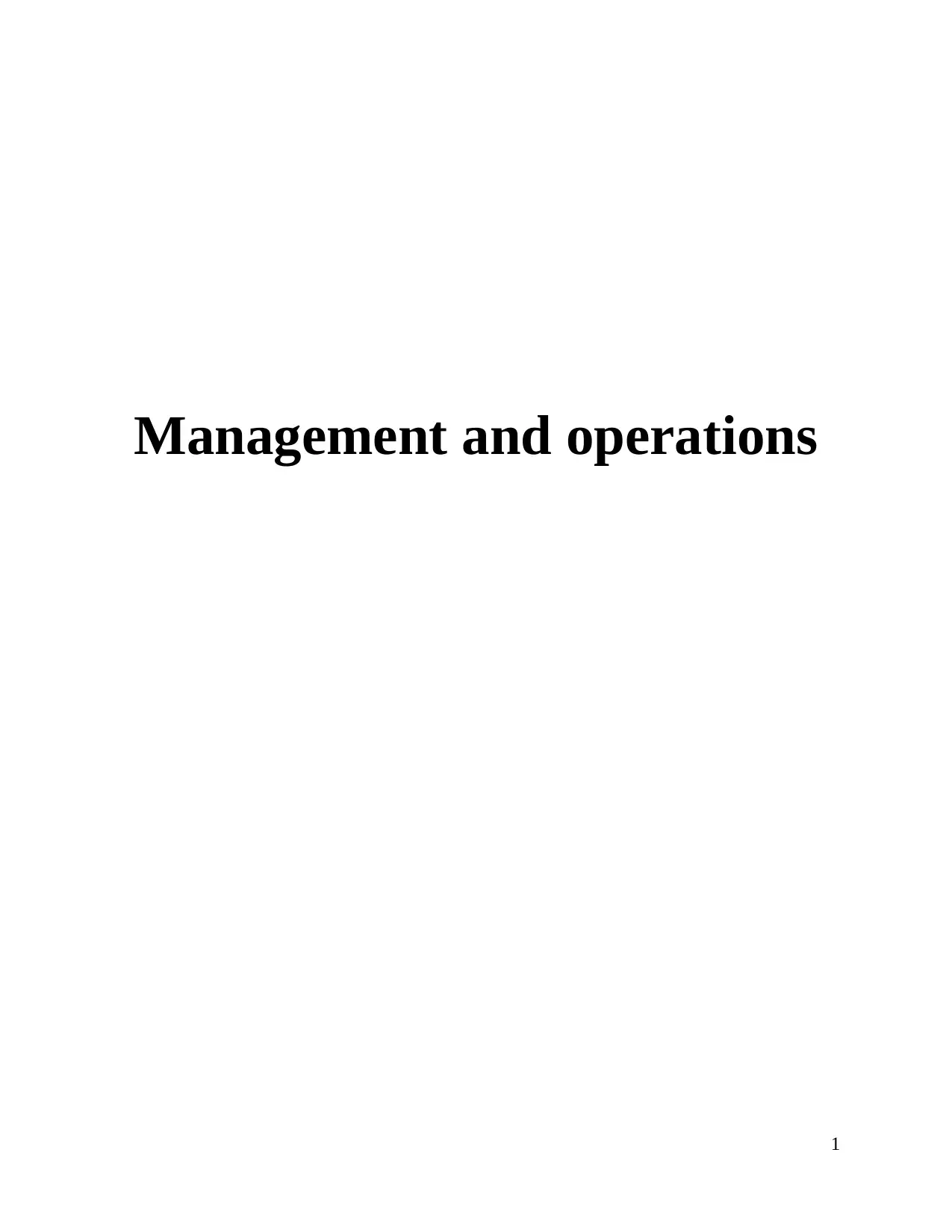
Management and operations
1
1
Paraphrase This Document
Need a fresh take? Get an instant paraphrase of this document with our AI Paraphraser
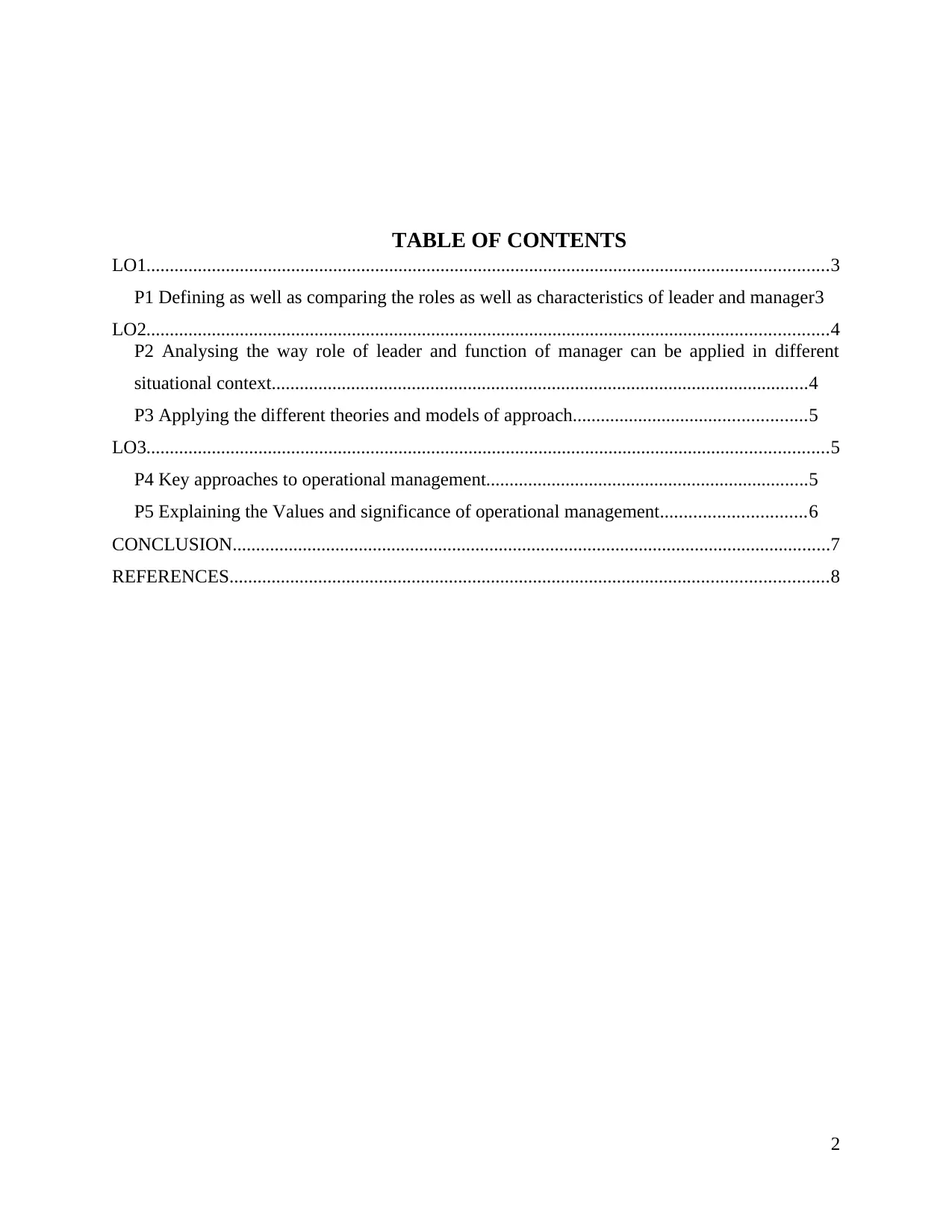
TABLE OF CONTENTS
LO1..................................................................................................................................................3
P1 Defining as well as comparing the roles as well as characteristics of leader and manager3
LO2..................................................................................................................................................4
P2 Analysing the way role of leader and function of manager can be applied in different
situational context...................................................................................................................4
P3 Applying the different theories and models of approach..................................................5
LO3..................................................................................................................................................5
P4 Key approaches to operational management.....................................................................5
P5 Explaining the Values and significance of operational management...............................6
CONCLUSION................................................................................................................................7
REFERENCES................................................................................................................................8
2
LO1..................................................................................................................................................3
P1 Defining as well as comparing the roles as well as characteristics of leader and manager3
LO2..................................................................................................................................................4
P2 Analysing the way role of leader and function of manager can be applied in different
situational context...................................................................................................................4
P3 Applying the different theories and models of approach..................................................5
LO3..................................................................................................................................................5
P4 Key approaches to operational management.....................................................................5
P5 Explaining the Values and significance of operational management...............................6
CONCLUSION................................................................................................................................7
REFERENCES................................................................................................................................8
2
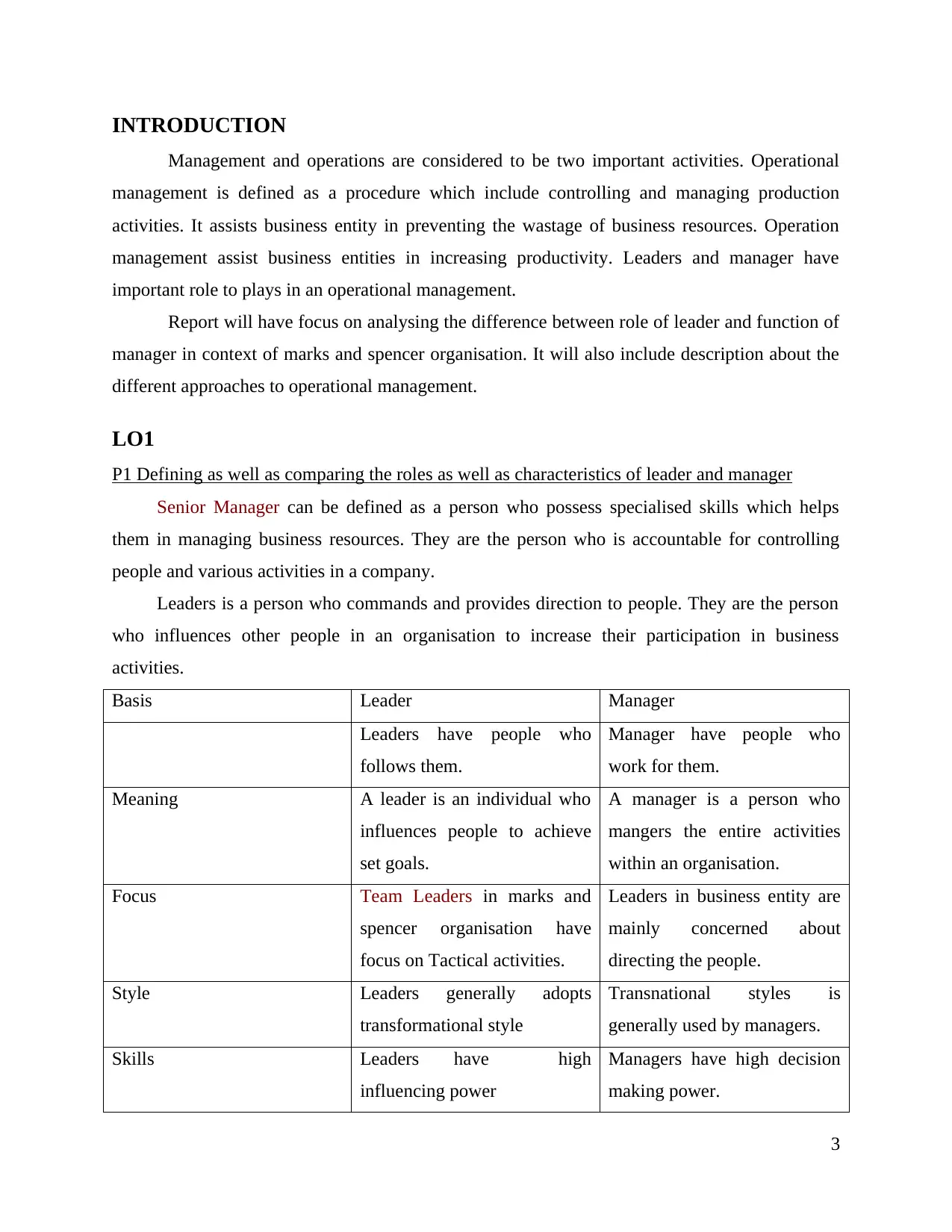
INTRODUCTION
Management and operations are considered to be two important activities. Operational
management is defined as a procedure which include controlling and managing production
activities. It assists business entity in preventing the wastage of business resources. Operation
management assist business entities in increasing productivity. Leaders and manager have
important role to plays in an operational management.
Report will have focus on analysing the difference between role of leader and function of
manager in context of marks and spencer organisation. It will also include description about the
different approaches to operational management.
LO1
P1 Defining as well as comparing the roles as well as characteristics of leader and manager
Senior Manager can be defined as a person who possess specialised skills which helps
them in managing business resources. They are the person who is accountable for controlling
people and various activities in a company.
Leaders is a person who commands and provides direction to people. They are the person
who influences other people in an organisation to increase their participation in business
activities.
Basis Leader Manager
Leaders have people who
follows them.
Manager have people who
work for them.
Meaning A leader is an individual who
influences people to achieve
set goals.
A manager is a person who
mangers the entire activities
within an organisation.
Focus Team Leaders in marks and
spencer organisation have
focus on Tactical activities.
Leaders in business entity are
mainly concerned about
directing the people.
Style Leaders generally adopts
transformational style
Transnational styles is
generally used by managers.
Skills Leaders have high
influencing power
Managers have high decision
making power.
3
Management and operations are considered to be two important activities. Operational
management is defined as a procedure which include controlling and managing production
activities. It assists business entity in preventing the wastage of business resources. Operation
management assist business entities in increasing productivity. Leaders and manager have
important role to plays in an operational management.
Report will have focus on analysing the difference between role of leader and function of
manager in context of marks and spencer organisation. It will also include description about the
different approaches to operational management.
LO1
P1 Defining as well as comparing the roles as well as characteristics of leader and manager
Senior Manager can be defined as a person who possess specialised skills which helps
them in managing business resources. They are the person who is accountable for controlling
people and various activities in a company.
Leaders is a person who commands and provides direction to people. They are the person
who influences other people in an organisation to increase their participation in business
activities.
Basis Leader Manager
Leaders have people who
follows them.
Manager have people who
work for them.
Meaning A leader is an individual who
influences people to achieve
set goals.
A manager is a person who
mangers the entire activities
within an organisation.
Focus Team Leaders in marks and
spencer organisation have
focus on Tactical activities.
Leaders in business entity are
mainly concerned about
directing the people.
Style Leaders generally adopts
transformational style
Transnational styles is
generally used by managers.
Skills Leaders have high
influencing power
Managers have high decision
making power.
3
⊘ This is a preview!⊘
Do you want full access?
Subscribe today to unlock all pages.

Trusted by 1+ million students worldwide
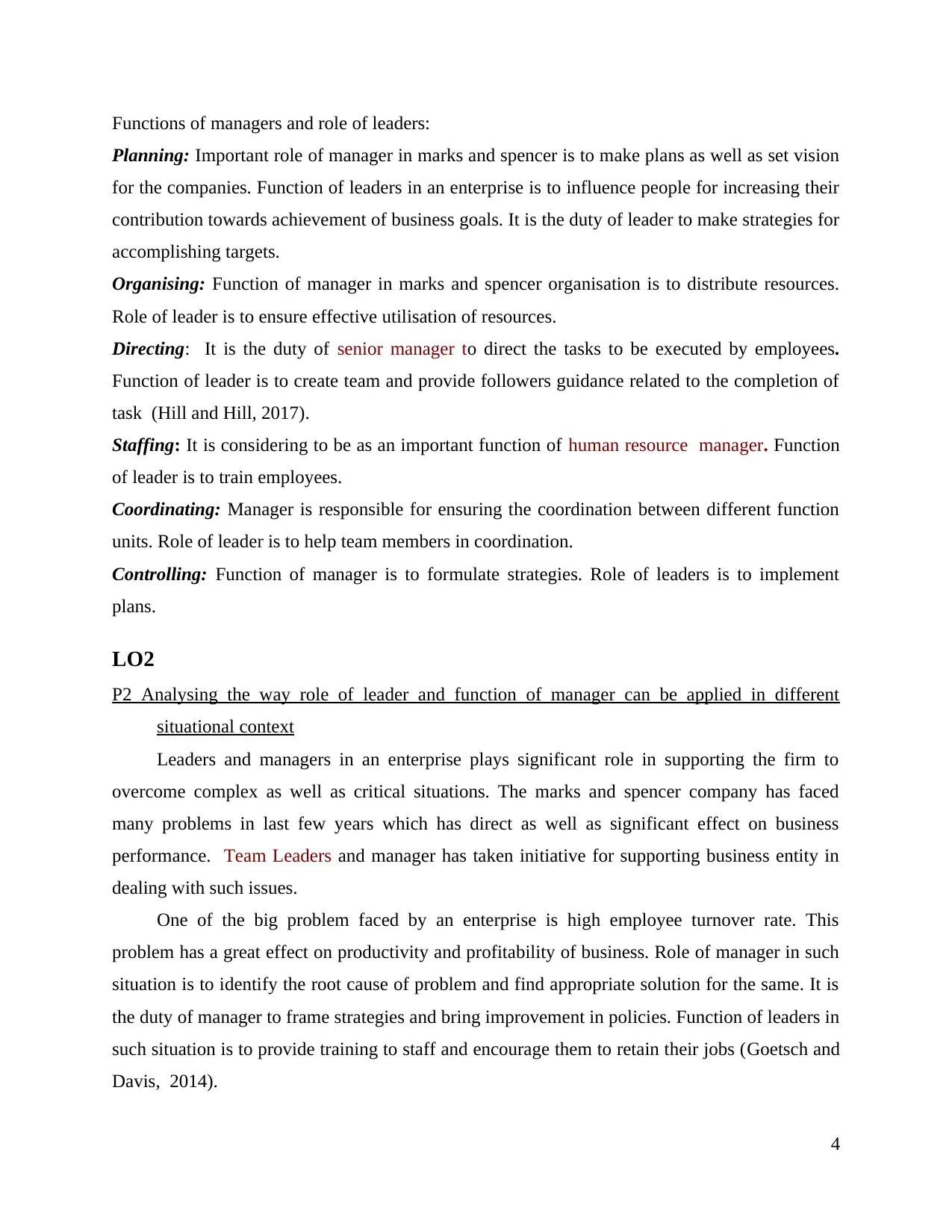
Functions of managers and role of leaders:
Planning: Important role of manager in marks and spencer is to make plans as well as set vision
for the companies. Function of leaders in an enterprise is to influence people for increasing their
contribution towards achievement of business goals. It is the duty of leader to make strategies for
accomplishing targets.
Organising: Function of manager in marks and spencer organisation is to distribute resources.
Role of leader is to ensure effective utilisation of resources.
Directing: It is the duty of senior manager to direct the tasks to be executed by employees.
Function of leader is to create team and provide followers guidance related to the completion of
task (Hill and Hill, 2017).
Staffing: It is considering to be as an important function of human resource manager. Function
of leader is to train employees.
Coordinating: Manager is responsible for ensuring the coordination between different function
units. Role of leader is to help team members in coordination.
Controlling: Function of manager is to formulate strategies. Role of leaders is to implement
plans.
LO2
P2 Analysing the way role of leader and function of manager can be applied in different
situational context
Leaders and managers in an enterprise plays significant role in supporting the firm to
overcome complex as well as critical situations. The marks and spencer company has faced
many problems in last few years which has direct as well as significant effect on business
performance. Team Leaders and manager has taken initiative for supporting business entity in
dealing with such issues.
One of the big problem faced by an enterprise is high employee turnover rate. This
problem has a great effect on productivity and profitability of business. Role of manager in such
situation is to identify the root cause of problem and find appropriate solution for the same. It is
the duty of manager to frame strategies and bring improvement in policies. Function of leaders in
such situation is to provide training to staff and encourage them to retain their jobs (Goetsch and
Davis, 2014).
4
Planning: Important role of manager in marks and spencer is to make plans as well as set vision
for the companies. Function of leaders in an enterprise is to influence people for increasing their
contribution towards achievement of business goals. It is the duty of leader to make strategies for
accomplishing targets.
Organising: Function of manager in marks and spencer organisation is to distribute resources.
Role of leader is to ensure effective utilisation of resources.
Directing: It is the duty of senior manager to direct the tasks to be executed by employees.
Function of leader is to create team and provide followers guidance related to the completion of
task (Hill and Hill, 2017).
Staffing: It is considering to be as an important function of human resource manager. Function
of leader is to train employees.
Coordinating: Manager is responsible for ensuring the coordination between different function
units. Role of leader is to help team members in coordination.
Controlling: Function of manager is to formulate strategies. Role of leaders is to implement
plans.
LO2
P2 Analysing the way role of leader and function of manager can be applied in different
situational context
Leaders and managers in an enterprise plays significant role in supporting the firm to
overcome complex as well as critical situations. The marks and spencer company has faced
many problems in last few years which has direct as well as significant effect on business
performance. Team Leaders and manager has taken initiative for supporting business entity in
dealing with such issues.
One of the big problem faced by an enterprise is high employee turnover rate. This
problem has a great effect on productivity and profitability of business. Role of manager in such
situation is to identify the root cause of problem and find appropriate solution for the same. It is
the duty of manager to frame strategies and bring improvement in policies. Function of leaders in
such situation is to provide training to staff and encourage them to retain their jobs (Goetsch and
Davis, 2014).
4
Paraphrase This Document
Need a fresh take? Get an instant paraphrase of this document with our AI Paraphraser
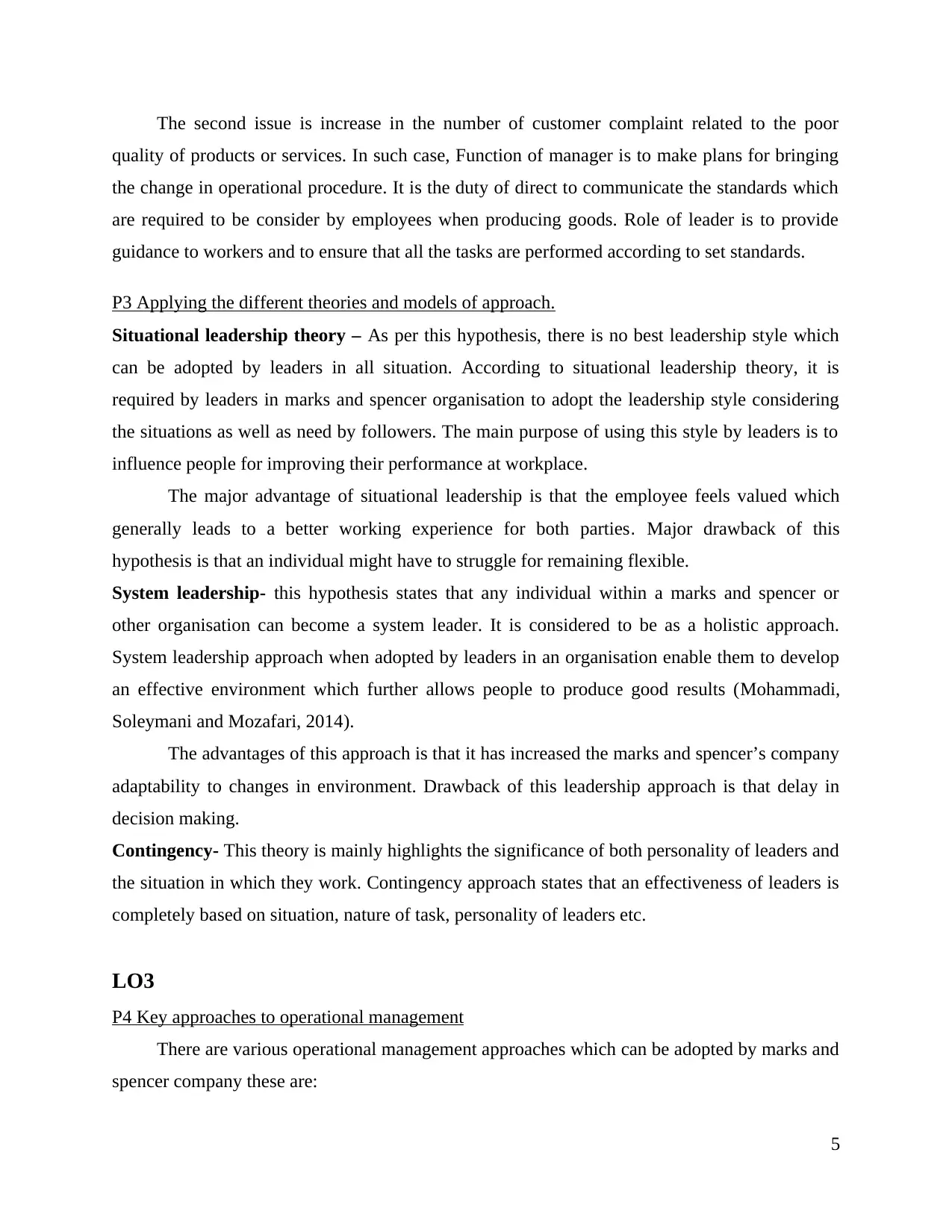
The second issue is increase in the number of customer complaint related to the poor
quality of products or services. In such case, Function of manager is to make plans for bringing
the change in operational procedure. It is the duty of direct to communicate the standards which
are required to be consider by employees when producing goods. Role of leader is to provide
guidance to workers and to ensure that all the tasks are performed according to set standards.
P3 Applying the different theories and models of approach.
Situational leadership theory – As per this hypothesis, there is no best leadership style which
can be adopted by leaders in all situation. According to situational leadership theory, it is
required by leaders in marks and spencer organisation to adopt the leadership style considering
the situations as well as need by followers. The main purpose of using this style by leaders is to
influence people for improving their performance at workplace.
The major advantage of situational leadership is that the employee feels valued which
generally leads to a better working experience for both parties. Major drawback of this
hypothesis is that an individual might have to struggle for remaining flexible.
System leadership- this hypothesis states that any individual within a marks and spencer or
other organisation can become a system leader. It is considered to be as a holistic approach.
System leadership approach when adopted by leaders in an organisation enable them to develop
an effective environment which further allows people to produce good results (Mohammadi,
Soleymani and Mozafari, 2014).
The advantages of this approach is that it has increased the marks and spencer’s company
adaptability to changes in environment. Drawback of this leadership approach is that delay in
decision making.
Contingency- This theory is mainly highlights the significance of both personality of leaders and
the situation in which they work. Contingency approach states that an effectiveness of leaders is
completely based on situation, nature of task, personality of leaders etc.
LO3
P4 Key approaches to operational management
There are various operational management approaches which can be adopted by marks and
spencer company these are:
5
quality of products or services. In such case, Function of manager is to make plans for bringing
the change in operational procedure. It is the duty of direct to communicate the standards which
are required to be consider by employees when producing goods. Role of leader is to provide
guidance to workers and to ensure that all the tasks are performed according to set standards.
P3 Applying the different theories and models of approach.
Situational leadership theory – As per this hypothesis, there is no best leadership style which
can be adopted by leaders in all situation. According to situational leadership theory, it is
required by leaders in marks and spencer organisation to adopt the leadership style considering
the situations as well as need by followers. The main purpose of using this style by leaders is to
influence people for improving their performance at workplace.
The major advantage of situational leadership is that the employee feels valued which
generally leads to a better working experience for both parties. Major drawback of this
hypothesis is that an individual might have to struggle for remaining flexible.
System leadership- this hypothesis states that any individual within a marks and spencer or
other organisation can become a system leader. It is considered to be as a holistic approach.
System leadership approach when adopted by leaders in an organisation enable them to develop
an effective environment which further allows people to produce good results (Mohammadi,
Soleymani and Mozafari, 2014).
The advantages of this approach is that it has increased the marks and spencer’s company
adaptability to changes in environment. Drawback of this leadership approach is that delay in
decision making.
Contingency- This theory is mainly highlights the significance of both personality of leaders and
the situation in which they work. Contingency approach states that an effectiveness of leaders is
completely based on situation, nature of task, personality of leaders etc.
LO3
P4 Key approaches to operational management
There are various operational management approaches which can be adopted by marks and
spencer company these are:
5
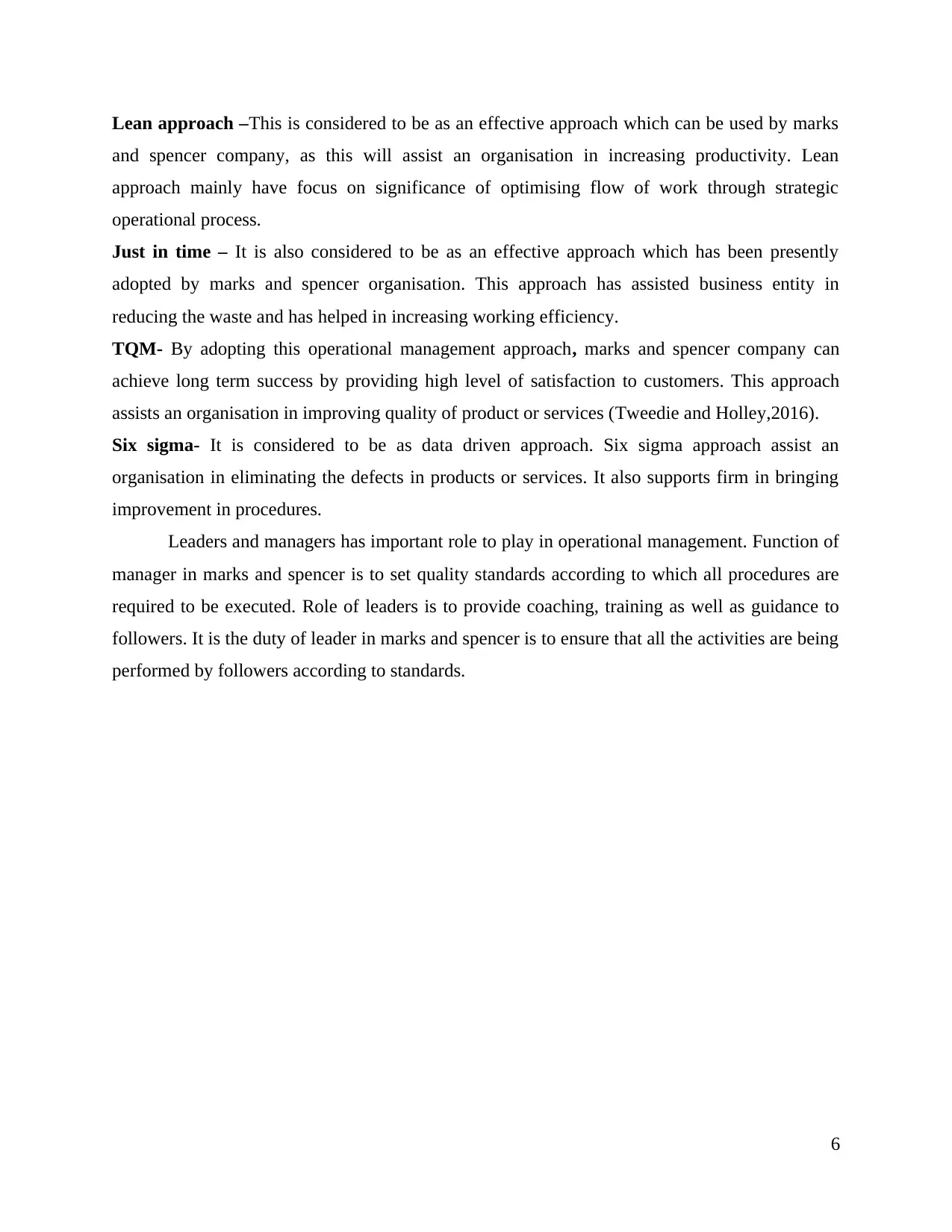
Lean approach –This is considered to be as an effective approach which can be used by marks
and spencer company, as this will assist an organisation in increasing productivity. Lean
approach mainly have focus on significance of optimising flow of work through strategic
operational process.
Just in time – It is also considered to be as an effective approach which has been presently
adopted by marks and spencer organisation. This approach has assisted business entity in
reducing the waste and has helped in increasing working efficiency.
TQM- By adopting this operational management approach, marks and spencer company can
achieve long term success by providing high level of satisfaction to customers. This approach
assists an organisation in improving quality of product or services (Tweedie and Holley,2016).
Six sigma- It is considered to be as data driven approach. Six sigma approach assist an
organisation in eliminating the defects in products or services. It also supports firm in bringing
improvement in procedures.
Leaders and managers has important role to play in operational management. Function of
manager in marks and spencer is to set quality standards according to which all procedures are
required to be executed. Role of leaders is to provide coaching, training as well as guidance to
followers. It is the duty of leader in marks and spencer is to ensure that all the activities are being
performed by followers according to standards.
6
and spencer company, as this will assist an organisation in increasing productivity. Lean
approach mainly have focus on significance of optimising flow of work through strategic
operational process.
Just in time – It is also considered to be as an effective approach which has been presently
adopted by marks and spencer organisation. This approach has assisted business entity in
reducing the waste and has helped in increasing working efficiency.
TQM- By adopting this operational management approach, marks and spencer company can
achieve long term success by providing high level of satisfaction to customers. This approach
assists an organisation in improving quality of product or services (Tweedie and Holley,2016).
Six sigma- It is considered to be as data driven approach. Six sigma approach assist an
organisation in eliminating the defects in products or services. It also supports firm in bringing
improvement in procedures.
Leaders and managers has important role to play in operational management. Function of
manager in marks and spencer is to set quality standards according to which all procedures are
required to be executed. Role of leaders is to provide coaching, training as well as guidance to
followers. It is the duty of leader in marks and spencer is to ensure that all the activities are being
performed by followers according to standards.
6
⊘ This is a preview!⊘
Do you want full access?
Subscribe today to unlock all pages.

Trusted by 1+ million students worldwide
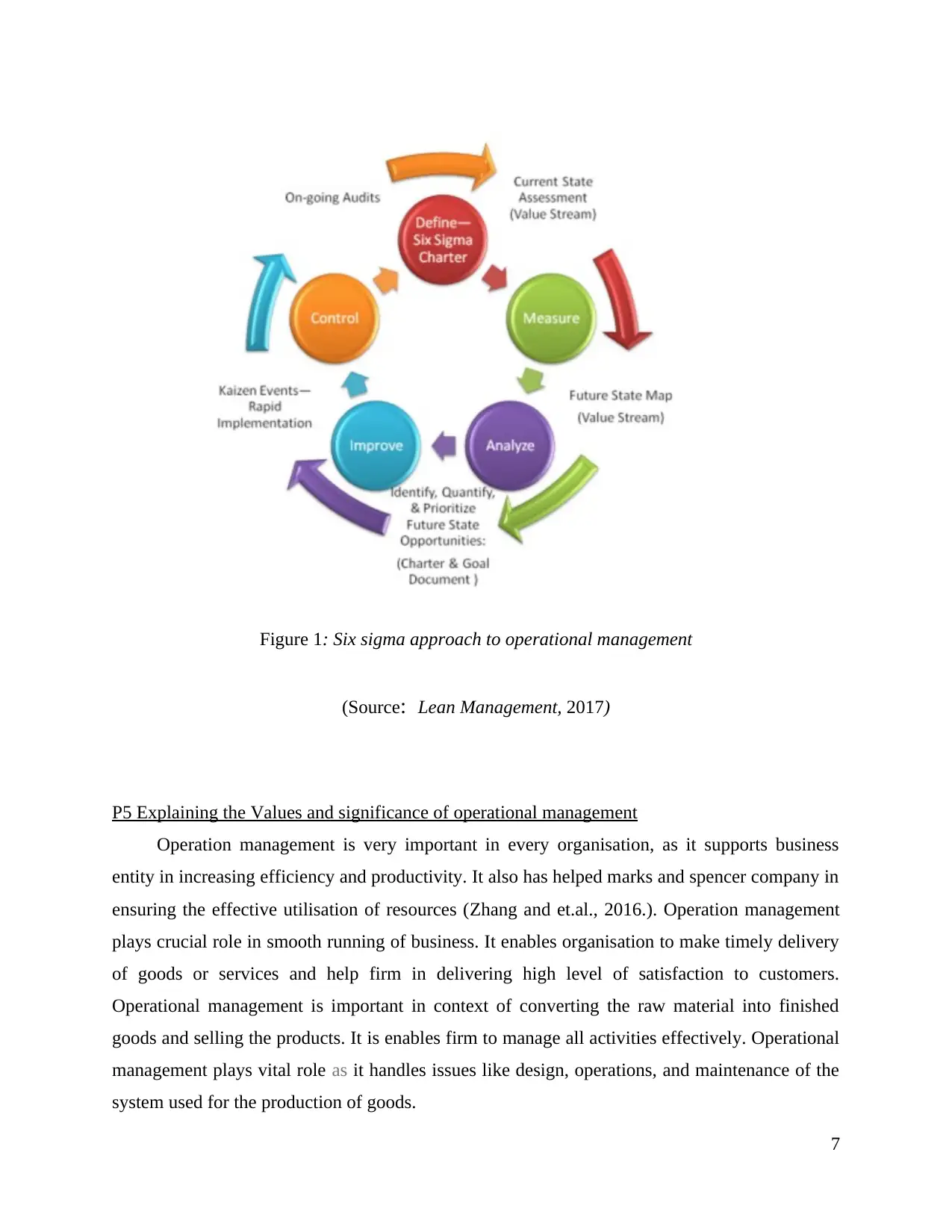
Figure 1: Six sigma approach to operational management
(Source: Lean Management, 2017)
P5 Explaining the Values and significance of operational management
Operation management is very important in every organisation, as it supports business
entity in increasing efficiency and productivity. It also has helped marks and spencer company in
ensuring the effective utilisation of resources (Zhang and et.al., 2016.). Operation management
plays crucial role in smooth running of business. It enables organisation to make timely delivery
of goods or services and help firm in delivering high level of satisfaction to customers.
Operational management is important in context of converting the raw material into finished
goods and selling the products. It is enables firm to manage all activities effectively. Operational
management plays vital role as it handles issues like design, operations, and maintenance of the
system used for the production of goods.
7
(Source: Lean Management, 2017)
P5 Explaining the Values and significance of operational management
Operation management is very important in every organisation, as it supports business
entity in increasing efficiency and productivity. It also has helped marks and spencer company in
ensuring the effective utilisation of resources (Zhang and et.al., 2016.). Operation management
plays crucial role in smooth running of business. It enables organisation to make timely delivery
of goods or services and help firm in delivering high level of satisfaction to customers.
Operational management is important in context of converting the raw material into finished
goods and selling the products. It is enables firm to manage all activities effectively. Operational
management plays vital role as it handles issues like design, operations, and maintenance of the
system used for the production of goods.
7
Paraphrase This Document
Need a fresh take? Get an instant paraphrase of this document with our AI Paraphraser
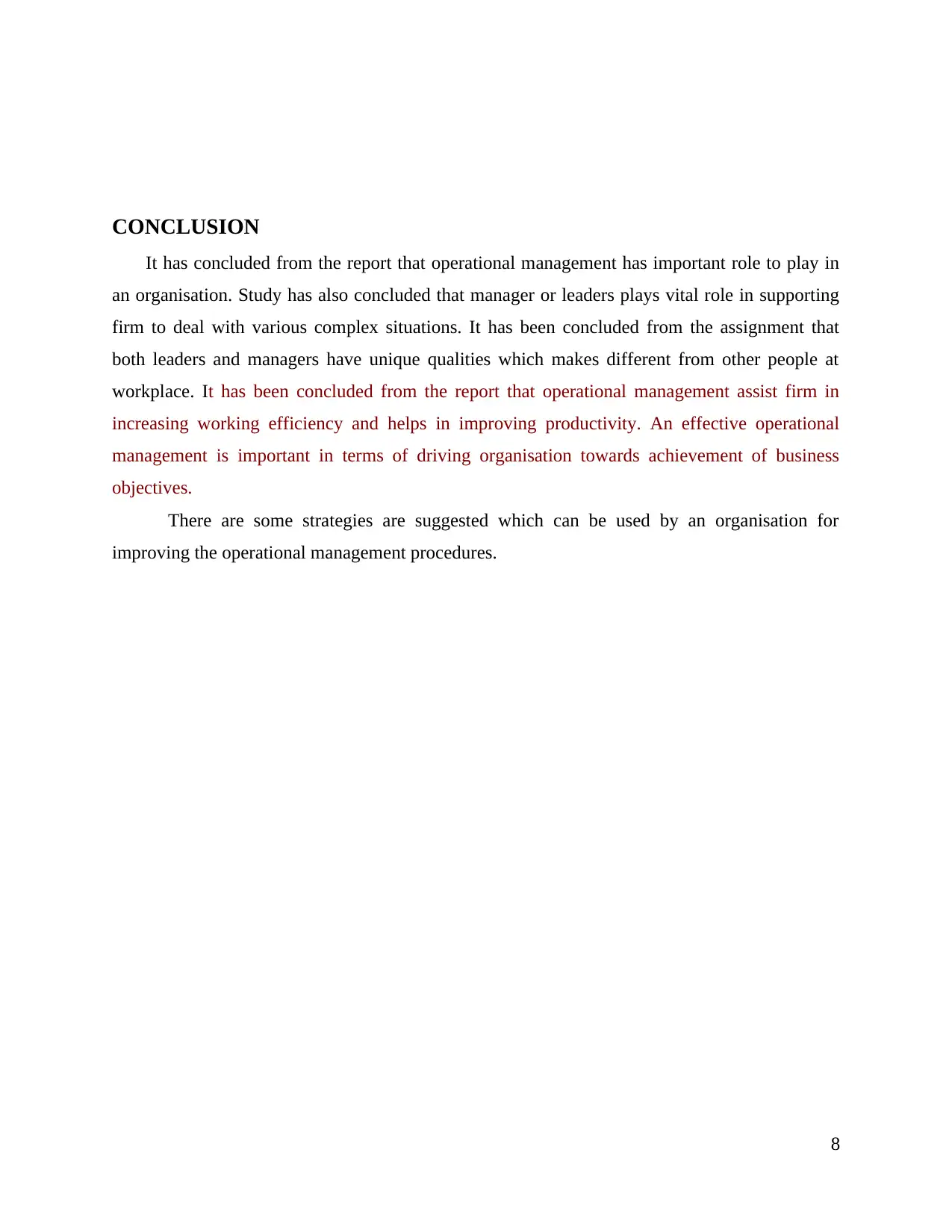
CONCLUSION
It has concluded from the report that operational management has important role to play in
an organisation. Study has also concluded that manager or leaders plays vital role in supporting
firm to deal with various complex situations. It has been concluded from the assignment that
both leaders and managers have unique qualities which makes different from other people at
workplace. It has been concluded from the report that operational management assist firm in
increasing working efficiency and helps in improving productivity. An effective operational
management is important in terms of driving organisation towards achievement of business
objectives.
There are some strategies are suggested which can be used by an organisation for
improving the operational management procedures.
8
It has concluded from the report that operational management has important role to play in
an organisation. Study has also concluded that manager or leaders plays vital role in supporting
firm to deal with various complex situations. It has been concluded from the assignment that
both leaders and managers have unique qualities which makes different from other people at
workplace. It has been concluded from the report that operational management assist firm in
increasing working efficiency and helps in improving productivity. An effective operational
management is important in terms of driving organisation towards achievement of business
objectives.
There are some strategies are suggested which can be used by an organisation for
improving the operational management procedures.
8
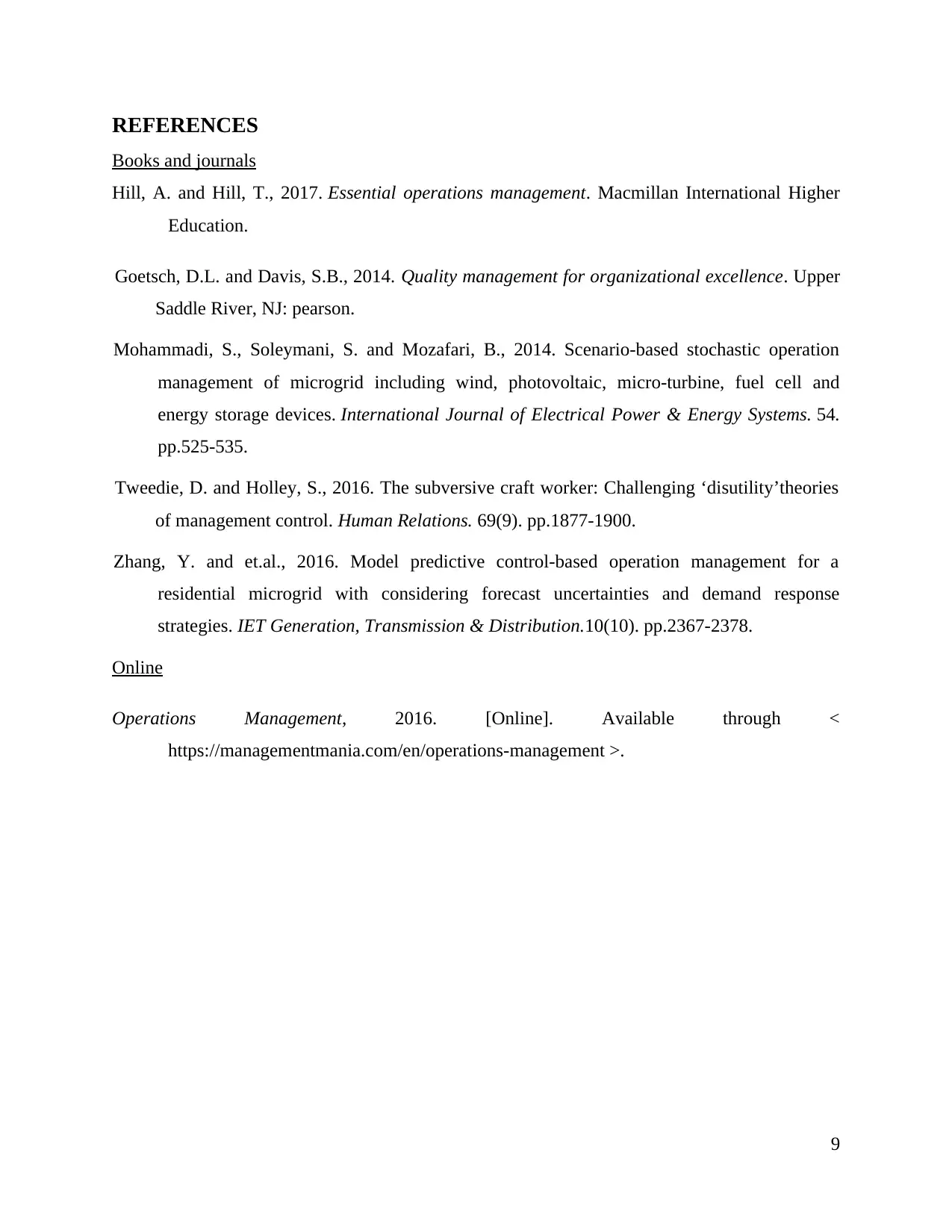
REFERENCES
Books and journals
Hill, A. and Hill, T., 2017. Essential operations management. Macmillan International Higher
Education.
Goetsch, D.L. and Davis, S.B., 2014. Quality management for organizational excellence. Upper
Saddle River, NJ: pearson.
Mohammadi, S., Soleymani, S. and Mozafari, B., 2014. Scenario-based stochastic operation
management of microgrid including wind, photovoltaic, micro-turbine, fuel cell and
energy storage devices. International Journal of Electrical Power & Energy Systems. 54.
pp.525-535.
Tweedie, D. and Holley, S., 2016. The subversive craft worker: Challenging ‘disutility’theories
of management control. Human Relations. 69(9). pp.1877-1900.
Zhang, Y. and et.al., 2016. Model predictive control-based operation management for a
residential microgrid with considering forecast uncertainties and demand response
strategies. IET Generation, Transmission & Distribution.10(10). pp.2367-2378.
Online
Operations Management, 2016. [Online]. Available through <
https://managementmania.com/en/operations-management >.
9
Books and journals
Hill, A. and Hill, T., 2017. Essential operations management. Macmillan International Higher
Education.
Goetsch, D.L. and Davis, S.B., 2014. Quality management for organizational excellence. Upper
Saddle River, NJ: pearson.
Mohammadi, S., Soleymani, S. and Mozafari, B., 2014. Scenario-based stochastic operation
management of microgrid including wind, photovoltaic, micro-turbine, fuel cell and
energy storage devices. International Journal of Electrical Power & Energy Systems. 54.
pp.525-535.
Tweedie, D. and Holley, S., 2016. The subversive craft worker: Challenging ‘disutility’theories
of management control. Human Relations. 69(9). pp.1877-1900.
Zhang, Y. and et.al., 2016. Model predictive control-based operation management for a
residential microgrid with considering forecast uncertainties and demand response
strategies. IET Generation, Transmission & Distribution.10(10). pp.2367-2378.
Online
Operations Management, 2016. [Online]. Available through <
https://managementmania.com/en/operations-management >.
9
⊘ This is a preview!⊘
Do you want full access?
Subscribe today to unlock all pages.

Trusted by 1+ million students worldwide
1 out of 9
Related Documents
Your All-in-One AI-Powered Toolkit for Academic Success.
+13062052269
info@desklib.com
Available 24*7 on WhatsApp / Email
![[object Object]](/_next/static/media/star-bottom.7253800d.svg)
Unlock your academic potential
Copyright © 2020–2026 A2Z Services. All Rights Reserved. Developed and managed by ZUCOL.





